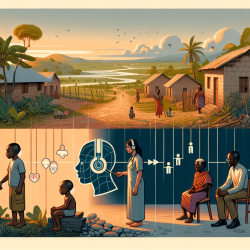Introduction
As practitioners dedicated to enhancing child health outcomes, understanding the cultural and social dynamics that influence maternal care is crucial. The research article "Beliefs and practices during pregnancy and childbirth in urban slums of Dhaka, Bangladesh" offers valuable insights into these dynamics, providing a foundation for improving maternal and child health services. This blog will explore the key findings of this study and discuss how practitioners can leverage this information to drive better outcomes.
Key Findings
The study conducted in the urban slums of Dhaka reveals several critical insights:
- Only 25% of recently delivered women received at least four antenatal care visits, and a mere 24% received postnatal care.
- Home deliveries were predominant, with 85% of births occurring at home, often assisted by untrained traditional birth attendants.
- Cultural beliefs and reliance on informal sectors for healthcare were significant, with landladies playing a crucial advisory role.
Implications for Practitioners
These findings highlight the need for targeted interventions in urban slum areas. Practitioners can enhance maternal care by:
- Promoting Behavioral Change: Develop programs that encourage antenatal and postnatal care visits, emphasizing the importance of skilled birth attendance.
- Enhancing Social Support: Recognize the influential role of landladies and engage them in health education initiatives to foster a supportive community environment.
- Utilizing Community Health Workers (CHWs): Train CHWs to provide consistent information and support, addressing cultural barriers and promoting healthcare access.
Encouraging Further Research
While the study provides a comprehensive overview, further research is needed to explore the effectiveness of interventions like the Manoshi program. Practitioners should consider conducting longitudinal studies to assess the long-term impact of these interventions on maternal and child health outcomes.
Conclusion
By understanding and addressing the unique challenges faced by women in urban slums, practitioners can play a pivotal role in improving maternal and child health outcomes. The findings from the Dhaka study serve as a valuable resource for developing targeted interventions and fostering a culture of health and wellness in these communities.
To read the original research paper, please follow this link: Beliefs and practices during pregnancy and childbirth in urban slums of Dhaka, Bangladesh.










